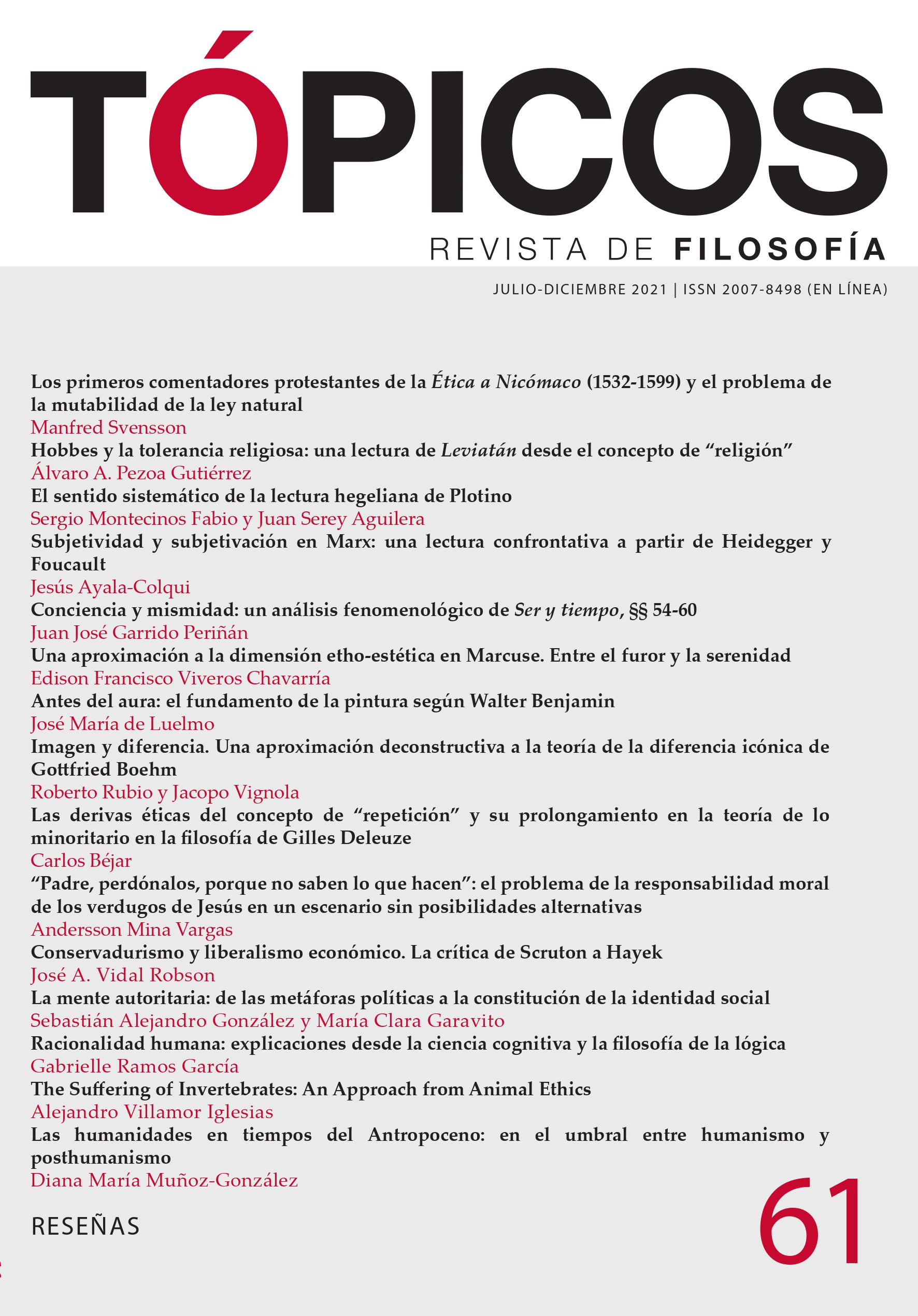Publicado 2021-06-23
Palabras clave
- filosofía política,
- ética,
- estética,
- Marcuse,
- teoría crítica
Derechos de autor 2021 Tópicos, Revista de Filosofía

Esta obra está bajo una licencia internacional Creative Commons Atribución-NoComercial-SinDerivadas 4.0.
Cómo citar
Resumen
Este artículo tiene el propósito de realizar una aproximación a la dimensión etho-estética en Marcuse. Este escrito parte de la siguiente tesis: la dimensión etho-estética consiste en la transformación de la subjetividad basada en una sensibilidad artística y una racionalidad crítica desde las cuales sean reconstruidas material e intelectualmente unas relaciones sociales opuestas a la sociedad industrial avanzada y su hombre unidimensional. La conclusión es: una teoría crítica marcusiana, heredera de Marx y Schiller, es aquélla capaz de analizar los posibles cambios cualitativos de los sujetos y las instituciones sociales para generar un mayor nivel de desarrollo racional, equitativo en la distribución de recursos y en la generación de mayores espacios de libertad. Su fundamento sería una actitud etho-estética que no disfruta del derroche, sino de la experiencia reflexiva de lo sensible.
Descargas
Referencias
- Conti, R. (2011) La desalienación estética en Schiller y Marcuse. Un retorno sobre el problema de la racionalidad mutilada. Tópicos. Revista de filosofía de Santa Fe, 21,61-92.
- Cragnolini, B. (1992) La posibilidad de una ética “estética”. Revista de filosofía y teoría política, 28-29, 42-50.
- Cuevas, R. (2014). La estética en Marcuse. Universidad Nacional de Educación a Distancia.
- Feijóo, J. (1990). Estudio introductorio. En F. Schiller, Kallias. Cartas sobre la educación estética del hombre. (pp. VII-CX). Anthropos.
- Kant, I. (2005). Crítica del juicio. J. Rovira Armengol (trad.). Losada.
- Kellner, D., Lewis, T. y Pierce, C. (2009). Marcuse and the Critique of Schooling. En Kellner, D., Lewis, T., Pierce, C. y Cho, K. (eds.), Marcuse’s Challenge to Education. (pp. 5-12). Rowman & Littlefield Publishers.
- Lewis, T. (2009). Biopower, Play, and Experience in Education. En Kellner, D., Lewis, T., Pierce, C. y Cho, K. (eds.), Marcuse’s Challenge to Education. (pp. 45-57). Rowman & Littlefield Publishers.
- López, C. (1999). Estética y liberación en H. Marcuse, en el centenario de su nacimiento. Contrastes. Revista interdisciplinar de filosofía, 4, 201-211.
- Marcuse, H. (1969a). Introducción. En Un ensayo sobre la liberación. (pp. 11-14). J. García Ponce (trad.). Editorial Joaquín Mortiz.
- Marcuse, H. (1969b). La nueva sensibilidad. En Un ensayo sobre la liberación. (pp. 30-53). J. García Ponce (trad.). Editorial Joaquín Mortiz.
- Marcuse, H. (1969c). Prólogo. En Un ensayo sobre la liberación. (pp. 7-10). J. García Ponce (trad.). Editorial Joaquín Mortiz.
- Marcuse, H. (1969d). ¿Un fundamento biológico para el socialismo? En Un ensayo sobre la liberación. (pp. 15-29). J. García Ponce (trad.). Editorial Joaquín Mortiz.
- Marcuse, H. (1999a). Una parálisis de la crítica: una sociedad sin oposición. En El hombre unidimensional. (pp. 19-28). A. Elorza (trad.). Ariel.
- Marcuse, H. (1999b). Un cierre del universo político. En El hombre unidimensional. (pp. 49-85). A. Elorza (trad.). Ariel.
- Marcuse, H. (2001). La dimensión estética. En Eros y civilización. (pp. 164-184). J. García Ponce (trad.). Ariel.
- Schiller, F. (1990a). Decimoquinta carta. En Kallias. Cartas sobre la educación estética del hombre. (pp. 229-243). J Feijóo y J. Seca (trads.). Anthropos.
- Schiller, F. (1990b). Novena carta. En Kallias. Cartas sobre la educación estética del hombre. (pp. 171-181). J Feijóo y J. Seca (trads.). Anthropos.
- Schiller, F. (1990c). Séptima carta. En Kallias. Cartas sobre la educación estética del hombre. (pp. 161-165). J Feijóo y J. Seca (trads.). Anthropos.
- Valencia, H. y Zúñiga, L. (2015). Cultura de masas y cultura afirmativa dentro del conflicto individuo y sociedad. Una aproximación desde la teoría crítica de la sociedad. Revista Filosofía UIS, 14(1),95-115.






